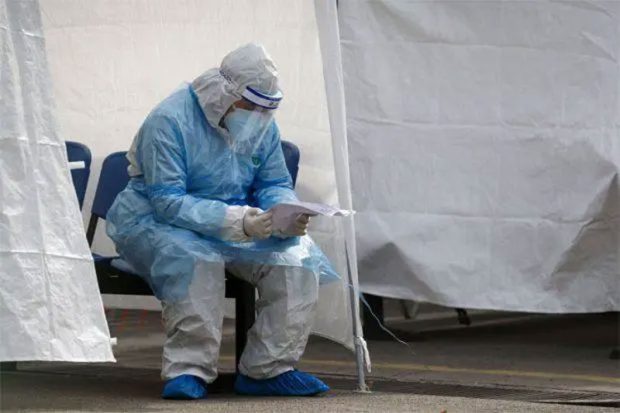
Centre issues revised home isolation guidelines as Covid cases surge
Team Udayavani, Jan 5, 2022, 2:31 PM IST

The Union health ministry on Wednesday said COVID-19 patients under home isolation will stand discharged after at least seven days from testing positive and no fever for three successive days, in revised guidelines for home isolation of mild or asymptomatic cases.
It also advised people not to rush for self-medication, blood investigation, or radiological imaging like chest X-ray or CT scan without consultation of treating medical officer.
Underlining that steroids are not indicated in mild disease and should not be self-administered, the ministry said overuse and inappropriate use of steroids may lead to additional complications.
Treatment for every patient needs to be monitored individually as per the specific condition of the patient concerned and hence generic sharing of prescriptions should be avoided, the revised guidelines stated.
According to the guidelines, patients under home isolation will stand discharged and end isolation after at least seven days have passed from testing positive and no fever for three successive days, but they shall continue wearing masks. Earlier, the duration of home isolation ended after 10 days of onset of symptoms.
There is no need for re-testing after the home isolation period is over. Asymptomatic contacts of infected individuals need not undergo Covid test and monitor health in-home quarantine, the guidelines stated.
”Information floating through social media mentioning non-authentic and non-evidence-based treatment protocols can harm patients. Misinformation leads to the creation of panic and in turn undertaking tests and treatment which are not required has to be avoided.
”Do not rush for self-medication, blood investigation or radiological imaging like chest X-ray or chest CT scan without consultation of your treating medical officer,” the guidelines read.
The revised guidelines also specified that the district administration under the overall supervision of the State Health Authority shall be responsible for monitoring patients under home isolation.
Listing responsibilities of grass root level surveillance teams, the ministry said the teams (ANM, sanitary inspector, MPHW, etc) shall be responsible for initial assessment of the patient and whether the requisite facilities are there for home isolation.
The health worker should contact the patient daily, preferably in-person or over telephone/ mobile, and obtain the details of temperature, pulse, oxygen saturation, patient overall wellness, and worsening of signs/symptoms.
The teams may also provide home isolation kits to the patient/caregiver as per the policy of the state government.
The kit may contain masks, hand sanitizers, paracetamol along with a detailed leaflet to educate patients and family members in the local language.
The surveillance teams shall also undertake patient education on the disease, its symptoms, warning signs, COVID-19 appropriate behavior and the need for vaccination for all eligible members.
Listing the responsibilities of the district/sub-district control room, the guidelines stated that they will be made operational and their telephone numbers well publicized so that people under home isolation may contact the control rooms for seamless transfer of patients through ambulance from home to the dedicated hospital.
According to the guidelines, asymptomatic cases are laboratory-confirmed cases that are not experiencing any symptoms and have oxygen saturation at room air of more than 93 percent.
Clinically assigned mild cases are patients with upper respiratory tract symptoms with or without fever, without shortness of breath, and having oxygen saturation at room air of more than 93 percent.
“The patient should be clinically assigned as mild/ asymptomatic case by the treating Medical Officer to be eligible for home isolation. Further, a designated control room contact number at the district/sub-district level shall be provided to the family to get suitable guidance for undertaking testing, clinical management-related guidance, assignment of a hospital bed, if warranted.
“Such cases should have the requisite facility at their residence for self-isolation and for quarantining the family contacts,” they said.
Elderly patients aged more than 60 years and those with co-morbid conditions such as Hypertension, Diabetes, Heart disease, Chronic lung/liver/ kidney disease, Cerebrovascular disease, shall only be allowed home isolation after proper evaluation by the treating medical officer, the guidelines said.
Patients suffering from immune-compromised status (HIV, transplant recipients, cancer therapy) are not recommended for home isolation and shall only be allowed home isolation after proper evaluation by the treating medical officer, they added.
Udayavani is now on Telegram. Click here to join our channel and stay updated with the latest news.
Top News

Related Articles More

Notorious gangster wanted in UAPA case arrested at Nepal border

‘Condition critical’, say doctors as farmer leader Dallewal’s fast enters 27th day

ISRO to study how crops grow in space on PSLV-C60 mission

Vandalism at Allu Arjun’s residence in Hyderabad

PM Modi to attend Christmas celebrations hosted by Catholic Bishops’ Conference of India
MUST WATCH
Latest Additions

Kannada Sahitya Sammelana: Food distribution creates stir

Rohit gets hit in nets, practice pitches on slower side

India & Kuwait elevate ties to strategic level; ink defence pact after PM Modi meets top Kuwaiti leaders

In Kuwait, PM Modi meets yoga practitioner, other influencers from Gulf country

Notorious gangster wanted in UAPA case arrested at Nepal border
Thanks for visiting Udayavani
You seem to have an Ad Blocker on.
To continue reading, please turn it off or whitelist Udayavani.
















